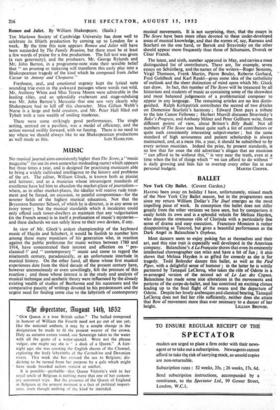MUSIC
No musical journal aims consistently higher than The Score,a "music magazine" (to use its own somewhat misleading name) which appears but three times a year, and is designed for practising musicians able to bring a widely cultivated intelligence to the history and problems of the art. The editor, William Glock, is known both as pianist and lecturer, and as a musician whose intransigent standards of excellence have led him to abandon the market-place of journalism— where, as in other market-places, the idealist will receive rude treat- ment and be forced, on occasion, to painful compromises—for the serener fields of the highest musical education. Not that the Bryanston Summer School, of which he is director, is in any sense an ivory tower ; but the musical staridiMs which it inculcates could only offend such tower-dwellers as maintain that any vulgarisation (in the French sense) is in itself a profanation of music's mysteries— and these diehards we can safely leave to their own devices, if any.
In view of Mr. Glock's ardent championship of the keyboard music of Haydn and Schubert, it would be foolish to number him among those many musicians of his generation who, in reaction against the public preference for music written between 1780 and 1914, have concentrated their interest and affection on "pre- classical and." contemporary" music and come to regard the nineteenth century, paradoxically, as an unfortunate interlude in musical history. On the other hand, all those whose first musical experiences date from the third decade of the present century have, however unconsciously or even unwillingly, felt the pressure of this reaction ; and those whose interest is in the study and analysis of musical technique and aesthetic theory were influenced by the already existing wealth of studies of Beethoven and his successors and the comparative paucity of writings devoted to his predecessors and the urgent need for finding some clue to the labyrinth of contemporary musical movementa. It is not surprising, then, that the essays in The Score have been more often devoted to these under-developed areas of musical knowledge, and that the names of, say, Rameau and Scarlatti on the one hand, or Bartok and Stravinsky on the other should appear more frequently than those of Schumann, Dvorak or Cesar Franck.
The latest, and sixth, number appeared in May, and carries a most distinguished list of contributors. There are, for example, seven essays on Schonberg, and the names of the writers—Roger Sessions, Virgil Thomson, Frank Martin, Pierre Boulez., Roberto Gerhard, Fred Goldbeck and Karl Rankl—gives some idea of the catholicity of outlook and the sheer distinction of mind upon which Mr. Glock can draw. In fact, this number of The Score will be treasured by all historians and students of music as containing some of the shrewdest and most balanced judgements of a problematical composer to appear in any language. The remaining articles are no less distin- guished. Ralph Kirkpatrick contributes the second of two irticles on Domenico Scarlatti's harmony ; Edward Dent pays a tribute to the late Canon Fellowes ; Herbert Murrill discusses Stravinsky's Rake's Progress, and Anthony Milner and Peter Gellhorn write, from different points of view, about Britten's Billy Budd. Not all numbers of The Score can boast quite such a list of contributors or quite such consistently interesting subject-matter ; but the same standard of high seriousness and patient scholarship is always maintained, and, at a mere 16s. a year, it should be subsdribed to by every serious musician. Indeed the price, by present standards, is so low that for once the old advertiser's slogan that no musician "can afford to be without this," is very near the truth, even at a time when the list of things which " we can afford to do without" is daily growing and bids fair to overtop every other list in our


























 Previous page
Previous page